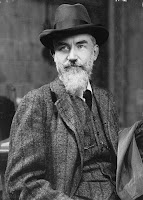“Why not a Financial Symphony? Allegro: Impending Disaster, Lento maestoso: Stony Broke, Scherzo: Light Heart and Empty Pocket, Allegro con brio: Clouds Clearing.”—Anglo-Irish Nobel Literature laureate George Bernard Shaw (1856-1950), June 29, 1932 postcard to English composer Sir Edward Elgar, quoted in F.W. Gaisberg, The Music Goes Round (1942)
Shaw, a music critic before he became a playwright,
certainly did not feel bashful about suggesting to “Pomp and Circumstance”
creator Elgar—in semi-retirement, following the death of his wife a dozen years
before—what his next musical subject would be.
Elgar didn’t take him up on it. But he did accept the
commission for a symphony that Shaw strongly urged the BBC have him do. That work
was unfinished at Elgar’s death from cancer in 1934.
But his extensive 130 pages of notes enabled British
composer Anthony Payne to finish the job over 60 years later. Symphony
No. 3 in C Minor ended up being performed 25 years ago
this week, to considerable acclaim.
When Shaw contributed his puckish idea to Elgar, the
world was in the grip of a worldwide depression. Considering the repercussions
of that economic collapse—not just the rise of Nazism in Germany, but also the
starry-eyed wonder many intellectuals in the West would hold for the Soviet
Union in those years—it definitely took a while for the “Clouds Clearing”
movement to develop.
If a “financial symphony” were created today in line
with Shaw’s concept, I’m afraid that the result could be every bit as
discordant as what happened during his time and Elgar’s.
(By the way, if you want to hear how Payne completed
Elgar’s project, listen to this YouTube clip of the performance by the
BBC National Orchestra of Wales.)

No comments:
Post a Comment